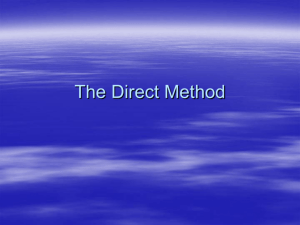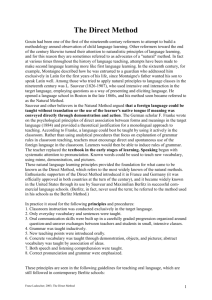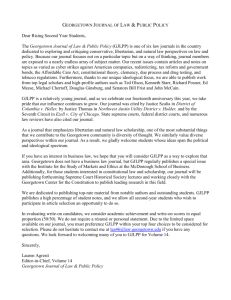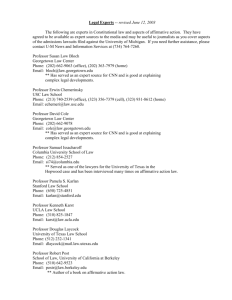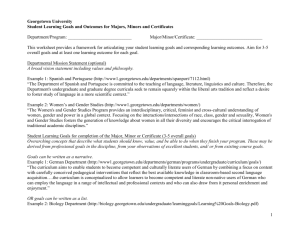Succeeding In Today's Global Marketplace
advertisement
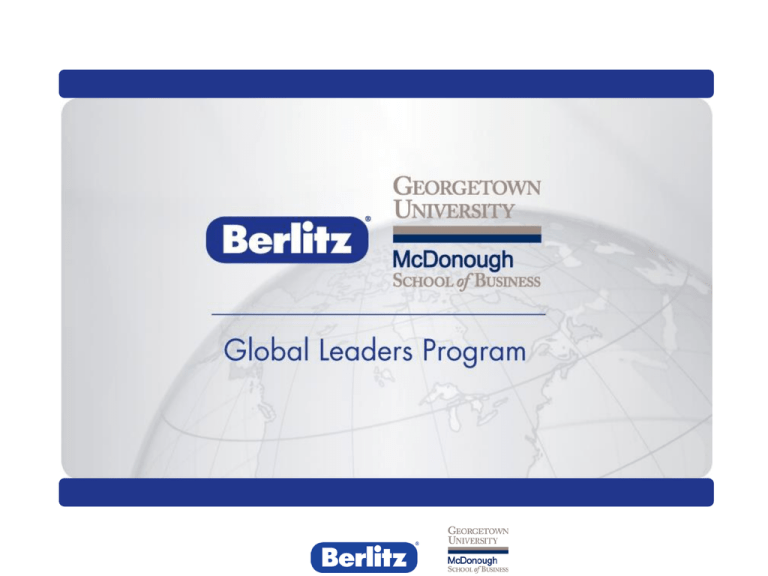
Succeeding In Today’s Global Marketplace Q. What challenges do you face in the global marketplace? Q. What markets are you looking to expand into? Or grow? Q. What’s your strategy for global growth? Berlitz - Georgetown University Global Leaders Program 2 “Globalization is an irreversible process, not an option” – Former UN Secretary General Kofi Annan • Defending market share and positions from national headquarters, no longer ensures success. • Rapid globalization, driven by inexpensive technology, increasing Internet use, a 24/7 flow of information and money and exponential growth in international trade have changed the rules of the game. • Today, successful companies need leaders who are global citizens with a global mind-set, capable of leading multifunctional, matrixed, multi-national, virtual teams. Berlitz - Georgetown University Global Leaders Program 3 Transforming Leaders Into Global Leaders Berlitz - Georgetown University Global Leaders Program 4 A Unique Offering Berlitz, the global cultural and language learning leader, has teamed up with the renowned Georgetown University to offer an innovative executive leaders program. The program uniquely integrates business acumen, communication skills and cultural competency to accelerate development of the next generation of global leaders. Berlitz - Georgetown University Global Leaders Program 5 To be a leader you need a vision. To be a global leader you need more. The program develops savvy leaders with a global mindset who can influence, persuade and consistently succeed in economic, social, technological and culturally diverse environments. Berlitz - Georgetown University Global Leaders Program 6 Program Themes Tied To Program Locations Four key business hubs around the globe have been selected so executives can acquire first hand local perspectives and insights and experience cultural differences. Program themes and content are tied directly to each location. Key executives are immersed in the culture, providing a level of mastery and global agility needed to drive your company to success in today’s competitive global environment. Berlitz - Georgetown University Global Leaders Program 7 Renowned Academic Directors The full resources of Georgetown University’s McDonough School of Business and Walsh School of Foreign Service combine with the cultural and language training expertise of Berlitz to provide a unique learning experience. Academic Directors Eileen Rogers, Vice President, Global Talent Solutions, Berlitz International, Inc. Ms. Rogers served most recently as the Global Director, Talent and Leadership Excellence with Deloitte Touche Tohmatsu, where she launched a comprehensive global leadership and management curriculum. Holding Masters degrees from Harvard and Johannes Gutenberg Universität where she was a Fulbright Scholar, she served as Director of Executive Education at Harvard, Boston University and Babson University, where she brought together faculty from major US business schools, IMD, London Business School and INSEAD. Stanley Nollen, Professor, McDonough School of Business Professor Nollen's field of research and teaching is international business. He studies firms and industries in emerging market economies and directs foreign study programs in Delhi, Bangalore, Dubai, Ho Chi Minh City, and Prague. His recent published research is about software and hardware industries in India and China, and the transition of firms in the Czech Republic. Professor Nollen twice received Fulbright awards in Delhi and Prague. He was an academic visitor at the London School of Economics and Universiteit Antwerpen. Professor Nollen teaches courses in international business and in macro- and micro-economics. He has won MBA teaching awards four times. Berlitz - Georgetown University Global Leaders Program 8 Integrated Learning Experience This learning experience integrates cuttingedge best practice executive learning methods including coaching, webinars and interactive roundtables with seasoned business executives, senior government officials, diplomats and prominent journalists. Berlitz - Georgetown University Global Leaders Program 9 On the ground experiential learning and networking • Site visits expose executives to regional business practices. • Roundtables and site visits provide opportunity to build networks and contacts in countries while acquiring business acumen in that area. • Participants will be able to network throughout the program and continue the dialogue on a secure online community created specifically for this program. Berlitz - Georgetown University Global Leaders Program 10 Even before the first in-person session, executives will: • Be trained online in communications and presentation skills (optional). • Take Berlitz’s proprietary Cultural Orientations Indicator® (COI), a statistically validated online cultural assessment that measures participants’ work style preferences to understand and leverage cultural diversity when working with others around the world. Berlitz - Georgetown University Global Leaders Program 11 Strategic Action Plan Real world challenges are integral to the program. An executive coach will be assigned to each program participant working with executives before, between and throughout the program on a strategic action plan relevant to your company. Berlitz - Georgetown University Global Leaders Program 12 Executive Coach Helps Assure Goals Are Met Before Module I Each participant identifies a real company challenge to focus on, creates a strategic action learning plan and gets C-suite approval, to ensure it will return value to the company. Participants are assigned an executive coach to review goals. During Participants with similar challenges work together in small groups Participants have access to faculty who are specialists in their challenge Executive coaches work with participants to assure progress against goals After Executives present ideas based on program learning and experiences to C-suite for adaptation Berlitz - Georgetown University Global Leaders Program 13 Who will benefit from this program • Senior executives • Minimum 15 years professional experience • Able to conduct business in English • Do not have to be a native English speaker Berlitz - Georgetown University Global Leaders Program 14 Timeline Designed to meet the needs and time constraints of busy executives, the Global Leaders Program is delivered in four one-week modules over eight months. The program is structured to progress from broader topics such as global economies to focus on the individual. End April May July 5 – 9 August 16 – 20 October 4 – 8 November 29 – December 3 Berlitz - Georgetown University Global Leaders Program Application Deadline Berlitz Program Module 1 (London) Module 2 (Shanghai) Module 3 (Bangalore) Module 4 (Washington D.C.) 15 Module 1: Global Market Dynamics: Global Economics (London, UK) The program kicks off in London, a city with historical significance as a center of international business. It examines the political and regulatory influences on global business while grounding participants in management fundamentals. Participants analyze macroeconomic structure and develop a greater understanding of inter-regional economic integration. Courses include: • The Global Environment of Business • Business Government and the Global Economy • Emerging Market Economics • Fiscal Monetary Policy Berlitz - Georgetown University Global Leaders Program 16 Module 1: Global Market Dynamics: Global Economics (London, UK) Dates: July 5-9, 2010 Location: London, UK Monday Tuesday Wednesday Arrival 9:00-10:30 AM Welcome and Program Introduction: Developing a Global Mindset 10:45AM-12:15PM 12:15AM-1:30M Travel to London 1:30-3:00 PM 3:15 - 4:45 PM Thursday Friday Business, Business, Government and the Government and the Global Economy Global Economy Fiscal and Monetary Policy Executive Roundtable Business, Business, Government and the Government and the Global Economy Global Economy Fiscal and Monetary Policy Regional Focus: Doing Business in Europe Lunch Lunch Lunch Lunch Lunch The Global Environment of Business The Global Environment of Business Emerging Market Economies The Global Environment of Business The Global Environment of Business Emerging Market Economies Site Visits: Parliament and the London Stock Exchange Leadership Application Session INTEGRATION SESSIONS 4:45- 6:00 PM FREE TIME Registration 6:00PM-7:00 PM Meet in hotel lobby at 6:00 7:00-8:15 PM Real Time Networking and Welcome Reception 6:15 - 7:30 pm 8:15 - 10:15 PM Berlitz - Georgetown University Global Leaders Program Dinner Opening Dinner How to be Coached/ Develop Strategic Action Plan Dinner City Discovery FREE EVENING GROUP WORK & CLASS PREPARATION 17 Module 1: Global Market Dynamics: Global Economics (London, UK) Courses Descriptions/Learning Objectives The Global Environment of Business This course helps participants explore the challenges and the solutions to competing globally. The course permits the students to gain insights into the creation of competitive advantage for countries and multinational firms. We will analyze firms and cross-border competition in various industries and originating from several countries and regions. The course discusses the tools for achieving a global competitive advantage -- the firm’s organizational structure, management systems, culture, leadership and its strategy. Business Government and the Global Economy This course offers an introduction to the political economy of international business. In today’s global economy, firms increasingly rely on non-market strategies to help shape the playing field on which they compete. The aim of this course is to examine how these strategies interact with market ones in a global economy shaped by the “visible hand” of governments and international institutions. The course surveys issues from the prevalence of so-called “border effects” (i.e., the way political boundaries impede the flow of commerce) to obligations under the World Trade Organization and the growing number of regional trade agreements, and from labor and environmental standards to the strength of intellectual property rights. Emerging Market Economies The purpose of this class is to discuss the possibilities and challenges involved when doing business in the developing world. The focus lies on strategies to deal with weak institutions and political and regulatory uncertainty. Emphasis on foreign investments and host country relationships, political risk, both at the country level and at the level of specific investments, and corruption. The objective is for participants to gain a better understanding of how to be successful when doing business in the developing world. Fiscal Monetary Policy This course provides an analysis of the international financial environment and operation of global financial markets; the economics of currency markets and foreign exchange risk; the mechanics and corporate uses of derivative; corporations' strategic alternatives and operational practices to manage risk; the decisions of companies as to when to hedge and not, and how to hedge using financial instruments. Berlitz - Georgetown University Global Leaders Program 18 Module 2: Global Industry Dynamics: Supply Chain Management (Shanghai, China) The program reconvenes in Shanghai, an emerging market with global manufacturing. The module develops participants’ understanding and application of corporate strategy, global supply chain and provides the tools necessary to assess market demands, examine industry forecasts, and investigate the dynamics of global competition. Courses include: • Industry Economics • Corporate Strategy and Industry Dynamics • Corporate Finance • Entering Emerging Markets • Global Logistics and Operations Management Berlitz - Georgetown University Global Leaders Program 19 Module 2: Global Industry Dynamics: Supply Chain Management (Shanghai, China) Dates: August 16 - 20, 2010 Sunday Location: Shanghai, China Monday Tuesday Wednesday Thursday Friday 9:00-10:30 AM Module Kick-Off and Action Learning Report-Outs Corporate Strategy and Industry Dynamics Competing in Diverse Industries Entering Emerging Markets Executive Roundtable 10:45AM-12:15PM Industry Economics Corporate Strategy and Industry Dynamics Competing in Diverse Industries Entering Emerging Markets Regional Focus: Doing Business in China 12:15AM-1:30M Lunch Lunch Lunch Lunch Lunch Industry Economics Corporate Finance Guided visit of the Expo in Shanghai Global Logistics and Operations Management Travel to Shanghai 1:30-3:00 PM Leadership Application Session Individual Pavilion exploration Industry Economics 3:15 - 4:45 PM Corporate Finance View cultural highlights at World Expo Global Logistics and Operations Management INTEGRATION SESSIONS 4:45- 6:00 PM FREE TIME Dinner 6:00PM-7:00 PM FREE TIME 7:00-8:15 PM Dinner Develop Strategic Action Plan 8:15 - 10:15 PM Berlitz - Georgetown University Global Leaders Program FREE TIME City Discovery/ Cultural Activity: China Expo Develop Strategic Action Plan GROUP WORK & CLASS PREPARATION 20 Module 2: Global Industry Dynamics: Supply Chain Management (Shanghai, China) Courses Descriptions/Learning Objectives Industry Economics The course begins with essential microeconomic concepts, including economic costs, market demand and profit maximization. We will then build on these concepts to examine how different types of industry structures provide better or worse profit-making opportunities for industry participants. We will develop understanding to how firms optimally set price and output levels; whether firms should enter or exit certain industries and under what circumstances; and how firms optimally respond to their competitors from strategic interaction. Corporate Strategy and Industry Dynamics Most firms compete not just in one business but in many. The issues of where to compete and how to create value from the corporate centre are the two basic questions of Corporate Strategy. The first question opens up a variety of options for corporate growth including the diversification of business and opens up the possibilities of choosing different modes of growth – including acquisitions and mergers, strategic alliances and internal development. The second question responds to the need to make sure that the corporate centre adds value to the corporation’s sets of businesses. This value added generates the corporate edge, i.e. the additional advantage resulting from belonging to a group of companies instead of each business competing independently in its respective industry. Good strategy can enable strong performance in growth, profitability, and market capitalization value when managed appropriately. This course aims to understand how. Corporate Finance The course aim is to develop a framework for corporate financial decision-making and provide a solid grounding in the principles and practice of financial management, so that participants are able to demonstrate proficiency in using Corporate Finance core concepts, models, and tools; act and behave as context screeners in order to identify main trends and to drive change factors in the field of Corporate Finance; integrate Corporate Finance concepts, models, and tools within the Corporate Strategy; thereby linking it with other functional areas in line with a firm's general process and knowledge management Entering Emerging Markets The first part of this course will focus on consumer behavior, competitive analysis, market segmentation, marketing research, and other conceptual and analytical tools necessary to facilitate the management of global markets. In the second part of the course the major decisions to design a marketing program will be covered, including positioning, product development, pricing, distribution and promotion. The third part of the course provides and integrative strategic view of marketing, including the impact of globalization, information technology, and challenges to implementation. Global Logistics and Operations Management Achieving excellence in global operations requires more than mastery of the latest models for management of supply chains and lean production. A key is the expertise for aligning internationally dispersed operations and supply chains into a cohesive global network. The objective in this course is to help you develop this expertise. You will learn how to analyze the operations and supply chain functions in any organization—manufacturing or service, domestic or multinational, commercial or nonprofit--and useful concepts, models and techniques for managing them. You will also learn how globalization is affecting production, supply chain, procurement, distribution, R&D and Engineering functions, and the challenges and opportunities faced by managers who must cope with these changes. Berlitz - Georgetown University Global Leaders Program 21 Module 3: Global Enterprise Dynamics: Information Technology (Bangalore, India) Bangalore is home to innovation and technology. This module explores the day-to-day management of global business operations and will focus on managing in emerging countries and demonstrating leadership in diverse environments. Courses include: • Entrepreneurship • Structuring and Managing the Global Enterprise • Marketing Strategies for Global Executives • Innovation and Technology • Leveraging Technology: Leading Organizational Change Berlitz - Georgetown University Global Leaders Program 22 Module 3: Global Enterprise Dynamics: Information Technology (Bangalore, India) Dates: October 4 - 8, 2010 Sunday Monday Module Kick-Off and Action Learning Report-Outs 9:00-10:30 AM Location: Bangalore, India Tuesday Wednesday Thursday Friday Innovation and Technology Leveraging Technology: Leading Multi-National Virtual Teams Executive Roundtable Innovation and Technology Leveraging Technology: Leading Multi-National Virtual Teams Regional Focus: Doing Business in India Lunch Site Visits: Infosys and TATA 10:45AM-12:15PM Entrepreneurship 12:15AM-1:30M Lunch Lunch Lunch Lunch Structuring and Managing the Global Enterprise Marketing Strategies for Global Executives Global Management: Processes and Practices Leading Organizational Change 1:30-3:00 PM Travel to Bangalore Leadership Application Session Structuring and Managing the Global Enterprise 3:15 - 4:45 PM Marketing Strategies for Global Executives Global Management: Processes and Practices Leading Organizational Change INTEGRATION SESSIONS 4:45- 6:00 PM FREE TIME Dinner Dinner Develop Strategic Action Plan FREE TIME 6:00PM-7:00 PM FREE TIME 7:00-8:15 PM 8:15 - 10:15 PM Berlitz - Georgetown University Global Leaders Program Dinner City Discovery/ Cultural Activity Develop Strategic Action Plan GROUP WORK & CLASS PREPARATION 23 Module 3: Global Enterprise Dynamics: Information Technology (Bangalore, India) Courses Descriptions/Learning Objectives Entrepreneurship We will examine how entrepreneurs establish and manage ventures that identify and realize business opportunities. We will work on the dimensions and dynamics of the entrepreneurial process; assist you in the identification of ideas for new ventures and the assessment of their potential to become real business opportunities; guide you through the ideas’ development into successful business models; and provide insights into how to develop the business plan of the new venture or to negotiate its financing with investors. We will also discuss key issues in growing and harvesting a business. We will explore the similarities and differences between the entrepreneurial efforts made within the boundaries of an existing corporation – what is known as corporate entrepreneurship or intrapreneurship – and those exercised in an independent new venture. Structuring and Managing the Global Enterprise This session will discuss the challenges and best practices involved in building a truly global enterprise, including multinational structure, systems and processes; location selection and coordination; implementing mergers and acquisitions; and organizational design. The second part of the course will provide frameworks for effectively managing the evolving multinational enterprise, including selection of (ethical) management incentives and other compensation issues. Marketing Strategies for Global Executives This session will prepare participants with the skills necessary to translate marketplace data into information that directs strategy. It will cover environmental assessment, consumer satisfaction, and evaluating marketing outcomes. The session provides a practical discussion of using marketing tools for enhanced decision-making. Innovation and Technology The course will relate how capabilities in technology and innovation can translate to greater performance in areas like customer service. Overall, this course will offer advanced insights to creating and implementing successful strategies in a changing environment. Leveraging Technology: Leading Multi-National Virtual Teams Many experts agree that teams are the primary unit of performance in any organization. Today there is a new kind of team—a “virtual” team made up of people who communicate electronically. Its members may work in different parts of a country, or across the globe. How well are these teams really working and what can be done to make them more effective? What are some of the benefits of the virtual team? What are the pitfalls? This session will offer tools for building successful virtual teams, and even capitalize on geographic and cultural diversity. Leading Organizational Change This course is an integrated approach to large-scale change in organizations. Change is analyzed from three levels: top management where planning and vision are critical, middle management where implementation is the focus, and lower levels where receptivity and upward influence are the emphases. Cases are used for each of the three main levels of analysis while experiential learning is used to develop change in management skills that cut across the three levels, including analysis and diagnosis, effective communication, employee involvement, and overcoming resistance Berlitz - Georgetown University Global Leaders Program 24 Module 4: Global Leadership Dynamics: Becoming A Global Leader (Washington, D.C., USA) Conducted in Washington, D.C., a hub of international business research and policy and U.S. political power, this module focuses on recent global business transformations, developing ethical and sustainable leadership practices, and the specific challenges facing executives. Courses include: • Systems Thinking • Intercultural Negotiations/ Negotiating Complex Multi-Party Deals • Influence and Persuasion, Leading with Emotional Intelligence • Building Social Capital and Retaining Top Talent • Multi-Cultural Ethics • Corporate Social Responsibility • Inclusive Leadership Berlitz - Georgetown University Global Leaders Program 25 Module 4: Global Leadership Dynamics: Becoming A Global Leader (Washington, D.C., USA) Dates: November 29 - December 3, 2010 Sunday Monday Module Kick-Off and Action Learning ReportOuts 9:00-10:30 AM 10:45AM-12:15PM Systems Thinking 12:15AM-1:30M Lunch 1:30-3:00 PM Location: Washington, DC, USA Tuesday Travel to Washington, DC 3:15 - 4:45 PM Systems Thinking Systems Thinking Intercultural Negotiations/ Negotiating Complex Multi-Party Deals Wednesday Thursday Leading With Emotional Intelligence Ethical Leadership: Multi-Cultural Ethics Leading With Emotional Intelligence Ethical Leadership: Corporate Social Responsibility Lunch Lunch Influence and Persuasion Building Social Capital and Retaining Top Talent Influence and Persuasion Building Social Capital and Retaining Top Talent Friday Regional Focus: Doing Business in the United States (Visit to Capitol Hill) Lunch Learning Consolidation Inclusive Leadership (keynote by Uchinaga-san, CEO of Berlitz, Vice Chair Benesse Corporation) Action Planning and Graduation Ceremony INTEGRATION SESSIONS 4:45- 6:00 PM FREE TIME FREE TIME 7:00-8:15 PM 8:15 - 10:15 PM Dinner Dinner 6:00PM-7:00 PM Develop Strategic Action Plan FREE TIME Finalize Strategic Action Plan Closing Reception and Dinner GROUP WORK & CLASS PREPARATION Berlitz - Georgetown University Global Leaders Program 26 Module 4: Global Leadership Dynamics: Becoming A Global Leader (Washington, D.C., USA) Courses Descriptions/Learning Objectives Systems Thinking Systems thinking is a framework that is based on the belief that the component parts of a system can best be understood in the context of relationships with each other and with other systems, rather than in isolation. Systems thinking's focus is on effect, not cause. This is particularly important in business. This session will increase participants’ skills for understanding the causes and dynamics of performance (both good and bad); provide the vocabulary and diagramming tools for communicating about systems; increase participants’ ability to help a team understand complex problems. Intercultural Negotiations/ Negotiating Complex Multi-Party Deals In today’s global business environment, negotiators who understand how culture affects negotiation fundamentals have a decided advantage at the bargaining table. Negotiators’ interests, their assumptions about strategy, and the economic, social, legal and political context of negotiation all vary with culture. Rather than offering country-specific protocol and customs, this course will provide a general framework to help negotiators manage cultural differences whenever they appear at the negotiation table. This course will challenge negotiators to expand their repertoire of strategies so that they can close deals, resolve disputes, and get teams to make decisions regardless of the cultures represented at the table. Influence and Persuasion Making a difference...that is the ultimate standard by which we judge our leaders. But to make a difference is not easy. For, to lead, you must have the ability to inspire followers by articulating and communicating an exciting vision of the future. However, an inspiring vision is not enough, as you must also have the ability to influence others to work together to realize that vision. And the keys to successful persuasion are building a base of influence and demonstrating the political savvy necessary to manage the politics and conflict associated with leading change. The primary objective of this course is to help you understand and master the skills associated with influence and persuasion. Leading with Emotional Intelligence Research has proven in multiple industries and functions that emotional intelligence proves to be the most important key to a successful career, the achievement of business value and results and a satisfying life. (www.eiconsortium.org) During this module, the concepts and skills of emotional intelligence will be explored and applied to embed the insights and understanding from EQ-i Business Report into every day leadership practices. Building Social Capital and Retaining Top Talent This course will explore how organizations effectively acquire, develop and retain human capital (the knowledge, skills and abilities that reside in individuals) while simultaneously enhancing their pool of social capital (the resources embedded within and available through social relationships). Because these relationships operate across geographic boundaries, the course will highlight important differences in cross-cultural management practices. Ethical Leadership: Multi-Cultural Ethics, and CSR This course has been designed to address ethical dilemmas in our world today. It is intended to explore the issues that we face when doing business globally, to provide a better understanding of how we should think through those challenges, and to present us in the process with the basis of making moral judgments across cultural and geographic divides. In the same vain, the course will also touch on CSR, a concept that can lead to potential business benefits and opportunities: risk management, impact on human resources, license to operate, brand differentiation and product development, and others Berlitz - Georgetown University Global Leaders Program 27 Distinguished, Experienced Faculty Marc L Busch, Associate Professor, Edmund A Walsh School of Foreign Service Expertise: international trade policy and law J. Bradford Jensen, Associate Professor, McDonough School of Business Expertise: economics, and the relationship between international trade and investment and firm performance Jeffrey T Macher, Associate Professor, McDonough School of Business Expertise: microeconomics, competitive strategy, and the management of technology and innovation Kasra Ferdows, Heisley Family Chair of Global Manufacturing, McDonough School of Business Expertise: production management Elaine Romanelli, Associate Professor, McDonough School of Business Expertise: strategic management and entrepreneurship Sandeep Dahiya, Associate Professor, McDonough School of Business Expertise: corporate finance and strategy Pietra Rivoli, Professor, McDonough School of Business Expertise: finance and international business Catherine Langlois, Associate Professor, McDonough School of Business Expertise: international business studies and pricing strategy Berlitz - Georgetown University Global Leaders Program 28 Distinguished, Experienced Faculty George Brenkert, Professor, McDonough School of Business Expertise: international business ethics Robert J Bies, Professor, McDonough School of Business Expertise: leadership and change management Prashant Malaviya, Associate Professor, McDonough School of Business Expertise: marketing, specifically how consumers use information to make product judgments and consumption decisions Catherine Tinsley, Associate Professor, McDonough School of Business Expertise: negotiations and conflict management Jeanine Turner, Associate Professor, Communication, Culture and Technology Expertise: communication technologies within organizations Douglas M McCabe, Professor, McDonough School of Business Expertise: labor relations, human resource management and organizational behavior Edward Soule, Associate Professor, McDonough School of Business Expertise: moral philosophy particularly where morality intersects management, corporate strategy and regulatory policy Brooks Holtom, Associate Professor, McDonough School of Business Expertise: how organizations acquire, develop and retain human and social capital Berlitz - Georgetown University Global Leaders Program 29 Berlitz International, Inc. Georgetown University Founded by Maximilian D. Berlitz in 1878, Berlitz International, Inc. is the world’s premier provider of premium language and cultural services. Merging 130 years of innovation in language services with the latest in technological advancements, Berlitz provides state-of-the-art language training, cultural consulting programs, and proficiency assessment & testing services. Berlitz has over 500 locations in 70 countries, and delivers live online programs via the Internet through Berlitz Virtual Classroom. Berlitz has the resources through this extensive network to accommodate the needs of businesses and organizations from one-on-one training to enterprise-wide programs. Georgetown University, a highly prestigious private institution, was founded in 1789, the same year the U.S. Constitution took effect. Today, Georgetown is a major international research university whose distinguished faculty include renowned international scholars who bring to the classroom a lifetime of experience. Located in Washington, D.C., the campus provides access to the nation’s capital and its myriad of cultural, civic, and government programs. The University has produced five Nobel prize winners and many graduates of note including William Clinton, 42nd President of the United States and current Philippines President Gloria Macapagal-Arroyo. Berlitz - Georgetown University Global Leaders Program 30 Invest in the future of your company with Berlitz International and Georgetown University. Berlitz International, Inc. 400 Alexander Park Princeton, NJ 08540-6306 United States Phone: +1 609 514 3130 Email: glp@berlitz.com www.berlitz.com
